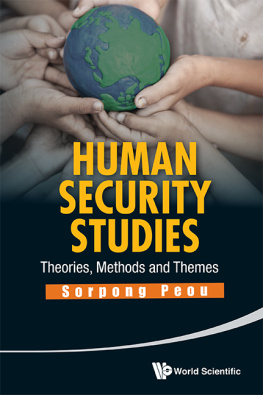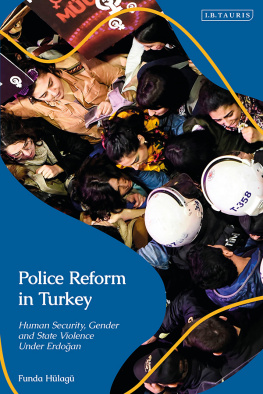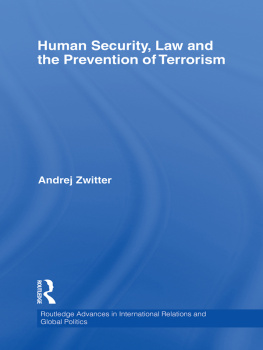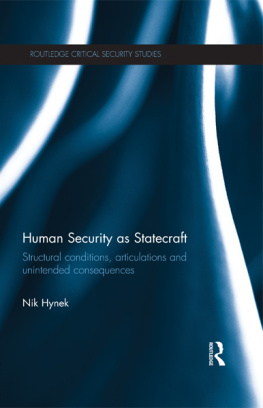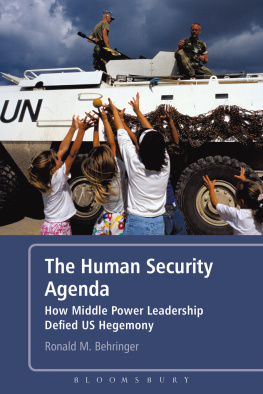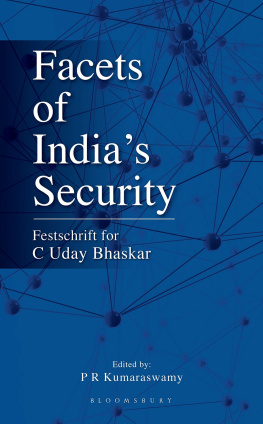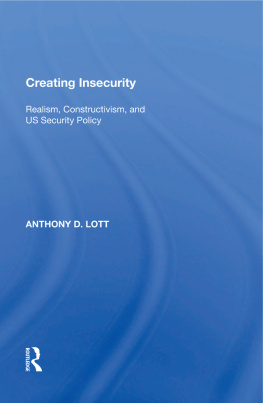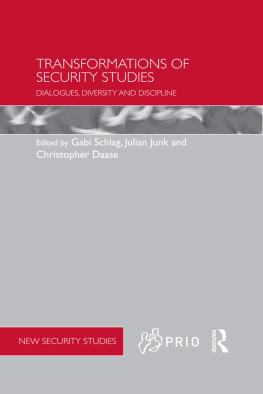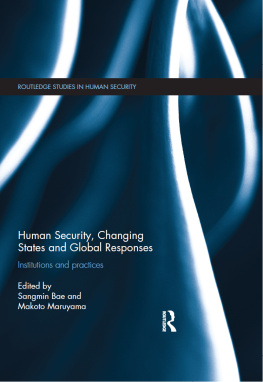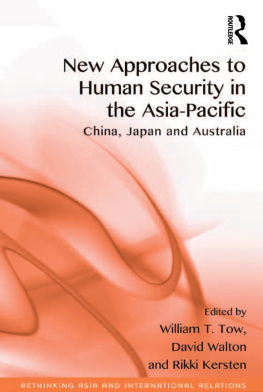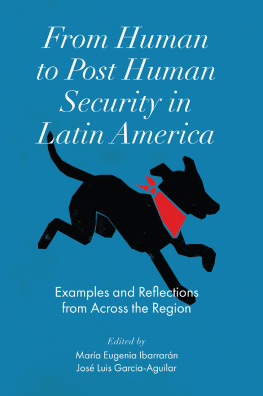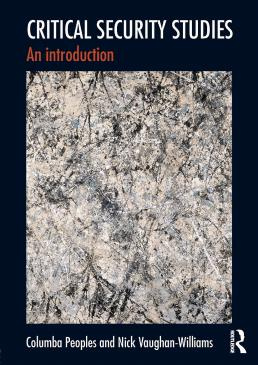Published by
World Scientific Publishing Co. Pte. Ltd.
5 Toh Tuck Link, Singapore 596224
USA office: 27 Warren Street, Suite 401-402, Hackensack, NJ 07601
UK office: 57 Shelton Street, Covent Garden, London WC2H 9HE
Library of Congress Cataloging-in-Publication Data
Peou, Sorpong.
Human security studies : theories, methods and themes / Sorpong Peou.
pages cm
ISBN 978-9814440455 (hardcover : alk. paper)
1. Human security. 2. National security. 3. Human rights. I. Title.
JC571.P373 2013
355'.033--dc23
2013016706
British Library Cataloguing-in-Publication Data
A catalogue record for this book is available from the British Library.
Copyright 2014 by World Scientific Publishing Co. Pte. Ltd.
All rights reserved. This book, or parts thereof, may not be reproduced in any form or by any means, electronic or mechanical, including photocopying, recording or any information storage and retrieval system now known or to be invented, without written permission from the Publisher.
For photocopying of material in this volume, please pay a copying fee through the Copyright Clearance Center, Inc., 222 Rosewood Drive, Danvers, MA 01923, USA. In this case permission to photocopy is not required from the publisher.
In-house Editors: Chye Shu Wen/Yvonne Tan
Typeset by Stallion Press
Email:
Printed in Singapore
Preface and Acknowledgements
This book is about the study of human security. It is a modest attempt modest in the sense that more can be done to improve its scholarly quality to address some of the contentions that scholars, policymakers, and practitioners continue to express. The topic is unlikely to fade away; much has been written, more is being written and still much more is likely to be written about it. Unfortunately, no major single text like this one is available for learning and teaching purposes. My colleague Amitav Acharya, for instance, raises this concern: Despite the proliferation of literature on security studies, the number of texts that can be used to teach a comprehensive course on human security remains extremely limited. Here, there is enormous scope for innovation. This book aims to make the study of human security more accessible to those who are unfamiliar with the concept but would like to learn more about it and, where possible, to promote dialogue among students of security, who often fail to engage with each other.
Human Security Studies as an area within Security Studies deserves scholarly and policy attention because it covers four important academic aspects: concepts, theories, methods, and themes. Human security is treated here as a concept, advanced, embraced and critiqued by scholars who subscribe to different theoretical traditions. Although human security was first formalized by the United Nations Development Program (UNDP) when it published a report in 1994, the concept was formulated on the basis of one established theoretical tradition, namely liberalism. It would be a mistake to treat human security as a theory totally distinct from other theoretical traditions such as realism, liberalism, critical theory, and feminism.
Theoretical perspectives range from those that are least humancentric namely, political realism to those that are most humancentric namely, the various radical perspectives. Critical theorists and feminists have not only critiqued the concept but also embraced it, although their ways of theorizing about security differ from those of realists and liberals. Because these theories are to varying degrees about the security of humans, they should be brought together under the broad conceptual umbrella of Human Security. Human Security Studies as an academic sub-field is distinct from other sub-fields of Security Studies but is not totally separate from them, since they share some common concerns. This does not mean that scholars now agree on what the threats to humans are, on who should provide for security and on what course of action should be taken.
Scholars may find it objectionable that I include realism in Human Security Studies. In my view, realists are not a homogeneous group of theorists,pattern in world history. Realists consider it impossible to dream of a utopian world completely free from power or armed politics. Liberals are more optimistic about the future of humanity, believing that linear progress is possible. Critical theorists and feminists regard themselves as more idealistic than liberals, but there are some inherent contradictions in radical thinking, one of which is that its proponents object to the use of force and hope that peaceful means will help build a new humane world order. When in power, radical leaders often rely on force. Building an egalitarian world looks impossible unless much force is used to achieve it through much repression. In short, these theories are concerned about the security of people but still differ on the question of which groups of people matter most, and they all raise the question of praxis (what can be done), since each can be criticized for advocating strategies that protect some people but potentially harm others.
Moreover, Human Security Studies as a growing field within Security Studies is not only about what advocates of human security think but also about what their critics say. Having reviewed the literature by placing various theoretical traditions under close empirical scrutiny, this book shows that each tradition has its strengths and weaknesses; no theory seems to provide the surest way of ensuring human security. Amitav Acharya is on to something helpful when he asserts that we need a holistic paradigm in the study of human security. He makes the following insightful assertion: While perspectives can differ in their degree of sensitivity to human security, they can each illuminate the varying conditions that affect the diffusion of human security norms in international relations.humane world. I find it disheartening to note that scholars often show contempt for or hostility towards each other because they see their work as superior without considering the possibility that they share some common concerns and express similar interests.
If human security is to have any true meaning, the place for us to start is where academics do their work. We can achieve this by doing our best to overcome the common tendency among some scholars to treat their work as belonging to a separate theoretical tradition superior to those of others. The first step begins with the deeper sense of humility that comes only from recognizing that our thinking is far from infallible and that the way we see and think about the world has both strengths and weaknesses. Unless such an attitude can be increasingly embraced, I see no real reason to hope for a more humane world.
Ultimately the book aims to promote awareness of the theoretical challenges in Human Security Studies by showing that none of the theoretical perspectives under discussion is completely flawless or totally flawed. This book is also based on my pedagogical position that each theoretical tradition has something useful to say about human security, that learning and teaching are not about suppressing ideas with which one strongly disagrees and uncritically advancing ones own ideas (nor are they about demonizing those with whom we do not see eye to eye), and that intellectual curiosity can only be stimulated by looking at critical issues in a realistic but eclectic way. Each theoretical tradition has certain wisdom that helps enrich our knowledge of the world and provides a critical assessment of the extent to which human security can be enhanced. Together, the strengths of each theoretical tradition can be creatively synthesized.




